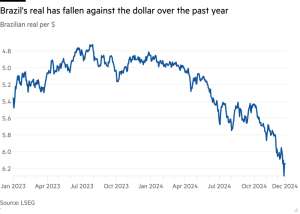why leaders need more support

Hello and welcome to Working It.
I took a break last week in the retreat house at the Chalice Well garden in the town of Glastonbury, epicentre of English folklore and magic. This peaceful garden (no phones allowed) has an ancient spring said to have healing powers. Even if you don’t believe in anything remotely spiritual, it’s a wonderful place to visit, and to sit quietly in nature 🌳.

And any digital detox is a valuable chance to rest and reflect. (Even when they don’t take place, as mine did, under a full moon🌕.)
Read on for a tip for 2025: coaching and peer support might be the best way to keep women — or indeed anyone — in senior jobs and prevent CEO and leader ‘churn’.
No Office Therapy this week as you’ve all been partying too hard to tell me your troubles🤢, but we will be back with fresh workplace problems, and your career dilemmas for Jonathan Black, in the new year.
Write to me at [email protected]. And thank you for the emails, messages and ideas this year💌. Please keep them coming. (Even the negative ones 👀.)
Leadership 2025: bring on the coaches and support groups 🙌🏻
We’ve been filming a Working It video (coming soon) about how companies can best approach retention and succession planning for CEOs and senior leaders. It’s a volatile world — and CEO turnover has never been higher. Yet what comes up again and again in my discussions is the loneliness and lack of time and space for reflection — let alone support💪🏼 — for people at the top of organisations.
As one of our video interviewees, Valerie Mocker, an experienced board member and founder of coaching company Wingwoman, told me: “The CEO job can be incredibly difficult. It can be incredibly lonely. And, also, behind the scenes we know that a lot of CEOs also are burnt out or on their way to burnout.”
What leaders need is support, and organisations are starting to get better at providing it. (Albeit from an often low base.) One idea Valerie mentioned was creating more opportunities for other people to step up and gain experience of running an organisation (perhaps during holidays or sickness cover). It creates a wider pool, both of potential leaders — and of people who understand the pressures facing the CEO.
And providing a coach or peer support actually does work to help development — probably for everyone, but it’s proven to do it for women who are leaders, according to Claudine Menashe-Jones, an international coach and leadership partner. This was one of the findings of her research among female leaders, published earlier this year. As Claudine told me: “Coaching is not routinely offered by organisations, leaving many women to fend for themselves and weave together the support they need.
“One piece of advice that the women interviewed wanted to give to their younger selves was ‘take time to think’. Sometimes this is about finding ways to ‘put your own oxygen mask on first’, so that you can serve others better . . . The emphasis here is not on learning new leadership skills or pursuing a specific goal but on developing that sense of yourself as a leader.”
Claudine’s work focused on female leaders, but the role of a coach or trusted mentor — or even of colleagues who ‘know how you feel’ because they have walked the same path — is vital. Another option is to really ‘lean into’ formal or informal support groups (see what I did there?). As Claudine told me: “What I find really interesting was this research shows that just being in a group with other people who are experiencing the same challenges as you makes you feel more able to deal with it. Not even because you get advice or tips — although you may get that — but because of this sense of ‘it’s not just me, I am not alone in this👯♂️’.”
In my (many) Working It conversations and interviews on the theme of leadership this year, coaching and peer-to-peer mentoring and support has always been mentioned as being vital in developing — and retaining — healthy, effective leaders. If we all know it, why isn’t it more often practised? As Claudine pointed out, “coaching is still often seen as a remedial intervention”.
My observation — unscientific, so feel free to tell me if I am wrong — is that coaching and support in 2024-25 is perceived in the same way as personal therapy and counselling was (at least in the UK) about 15 years ago. When I first went into therapy in 2008, plenty of friends and family told me that I must be very weak to have to resort to it. It was seen as a remedial personal intervention🫤.
Things have changed enormously since then, and talking cures have gone mainstream, because they work. Is leadership coaching going to have its own breakthrough moment in 2025? I’d love to hear your thoughts: [email protected].
This week on the Working It podcast
What happens after you miss out on that big promotion? How well do you handle rejection😢? The FT recently reported that thousands of staff at Citigroup missed out on title changes and pay rises this year, while Goldman Sachs has just announced its new partners — it only does this every other year, and only a fraction of staff get the coveted promotion.
That sparked my interest: we all face disappointment at work, and how we handle it and move on is critical to our future wellbeing and progression. On the podcast this week I talk to Sarah Ellis, co-founder of Amazing If, which specialises in practical training to help us embrace “squiggly careers” — not all trajectories have to be relentlessly upwards. And my colleague Anjli Raval gives the perspective from the top: how do senior executives view their careers? Can they be “squiggly”, too?
The five biggest work stories of 2024 🚛
These are the most popular FT workplace and workplace-adjacent stories this year, based on the number of page views online, from January-December. The winner is FT chief data reporter John Burn-Murdoch, and his article wasn’t even published until September. (Not that it’s a competition. Although it should be🏇🏻.)
-
Young women are starting to leave men behind: Even my non-MSM-loving Gen Z offspring have read (or at least seen TikToks about) John Burn-Murdoch’s vital, and viral, article about the educational and earnings gains made by young women, while many young men are increasingly disaffected. I’ve already seen it cited in several presentations about the future of work.
-
The FT’s 25 most influential women of 2024: This annual magazine special feature always gets lots of readers, and rightly so. The design is stunning and the writers are themselves A-listers. The 2024 edition includes Charli XCX by Gillian Anderson and Taylor Swift by Sheryl Sandberg.
-
The workplace under Labour: employers braced for biggest shake-up in a generation: A post-election blockbuster from Delphine Strauss, covering all the pledges made by the UK’s new government on things like zero-hours contracts. (Nobody saw the NI rise coming, though.
-
EY fires staff who took multiple online training courses at once: Numbers four and five (see below) in the 2024 hit parade are stories about people being fired from big companies for small (or smallish) infractions like this. Do we click on these stories because we worry about our own stationery/meal voucher habits? Or because it’s extraordinary that they got fired?
-
Meta fires staff for abusing $25 meal credits: See above 👆.
One more thing . . .
The team at FTAlphaville, our markets blog, publishes an annual round-up of FT journalists’ nominations for the best non-FT writing and podcasts of the year. Read about them here. Selected stories include a first-person account from a personal finance expert who got scammed, and a secret gay sex carriage on the Mexico City subway. (There, I piqued your interest🕵️♀️.)
This week’s (prizewinning) giveaway 📕
The FT/Schroders Business Book of the Year 2024 is Supremacy by Parmy Olson, a gripping tale of the rivalry between Demis Hassabis of Google DeepMind and Sam Altman of OpenAI — and of the dangers of unregulated AI. The prize-giving dinner at The Peninsula in London last week was a fantastic event (think Oscars, but for hardbacks🏆).
For a reminder of the rest of the outstanding shortlist, look here — all the titles are good last minute Christmas gifts for the (other) FT readers in your life.
I have a selection of the shortlisted books to give away and will send out a “potluck” volume to each winner in this week’s giveaway. There’ll be at least six and perhaps more (depending on how many books I can scoop up!) — so do enter here 📪. I’ll draw at random from all entries in the box at noon on Friday 20 and will notify winners.
Festive cheer-AI content 🎁
At the end of a year filled with AI hype and misunderstanding (and that was just me) we talked to actual experts about the actual state of AI in the Workplace. The resulting Working It video is a hit on YouTube, not least because it features Azeem Azhar, founder of the influential Exponential View tech trends newsletter. Azeem told me about the fleet of AI “agents” he already sends to meetings: one to take notes, one to give him performance feedback — and so on and on😳.
We’ll see you, or your agentic AI, back here in 2025 🤖.
Finally, a thank you . . . 💐
. . . to the FT colleagues who made Working It work in 2024. Most importantly, Alice Fishburn, a fantastically supportive manager🏅.
And to the brilliant Working It team: Gordon Smith edits this newsletter, Mischa Frankl-Duval produces the podcast and Claire Justin masterminds our videos. Thanks also to Clare Allen, Claer Barrett, Cheryl Brumley, Hanna Dokal, Sarah Ebner, Petros Gioumpasis, Kritasha Gupta, Michael Hepburn, Freya Hyde, Emma Jacobs, Veronica Kan-Dapaah, Elena Losavio, Charlotte Otterson, Manuela Saragosa, Bethan Staton, Richard Topping and Carolina Vargas🙏🏻.
#leaders #support







